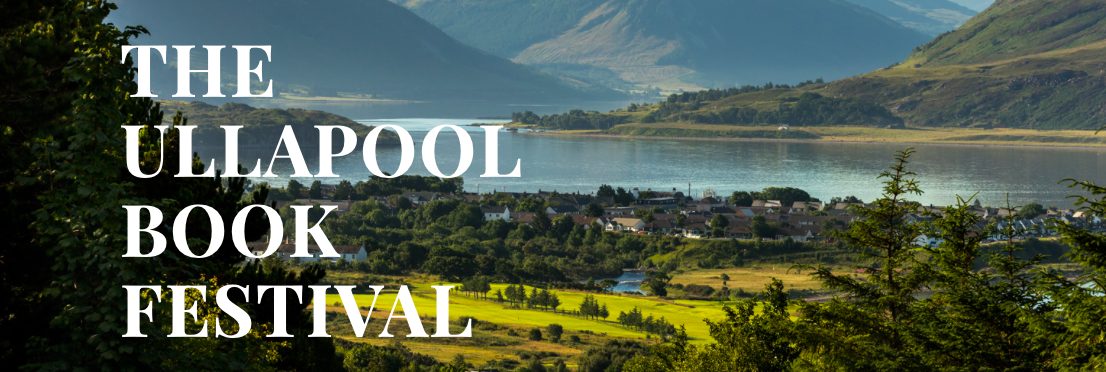It is only fitting that the way to the Highlands’ oldest book festival, now in its fifteenth year, should lead through the most spectacular landscape the Highlands have to offer. Sun-rays creep into every fold of the land, light up every pool in which rocks and pebbles seem to float. Soon the town of Ullapool creeps into view on the eastern shore of Loch Broom. Ullapool Book Festival awaits.
It shouldn’t work, it really shouldn’t. Most would class this area as too remote, and yet for this one weekend in May, it has no trouble attracting some of the biggest names in Scottish Literature and beyond.
The 7am start from Inverness is rewarded by an early session of readings from four award-shortlisted writers. Later tonight, one of them will be named as the winner of the Highland Book Prize, and Neil Ansell gets the audience off on a reflective start, writing movingly in The Last Wilderness about a reclaimed connection with the natural world, and about his own progressive hearing loss. Next up is Andrew Miller whose novel Now We Shall be Entirely Free follows the journey of an cavalry man who flees from Spain to the Outer Hebrides in the early 19th century, pursued by assassins. The quirky extract describes an unsettling encounter with natives in the Wye valley of Wales, and like Ansell’s, it is set in spring, mirroring the world we have just travelled through.
Former journalist Judith Ross Napier and her non-fiction book The Assynt Crofter describes her own experiences in covering the ‘winning of the land’ by the Assynt crofters. It is a wry, behind-the-scenes look at the workings of local press and is utterly entertaining, the audience roaring with laughter on several occasions. The fourth shortlistee is Mallachy Tallack, who first featured at Ullapool several years ago with his travelogue-come-autobiography Sixty Degrees North and is shortlisted now for his novel The Valley at the Centre of the World. His insightful portrayal of the voices within a small community in Shetland is both poetic and deep, a place where stories cling to stories, love clings to love.
A brief sprint for coffee in the tent next door and we return to hear local historian Andy Drummond. Tall and gangly with hair verging on wild, he amusingly has to fold himself out of the way a little awkwardly to allow the audience to see the maps of the Highlands where proposed railways were going to but failed to be built. He offers an entertaining insight into 19th century infrastructure and bureaucratic processes so often driven from London. Satire is never far away and politicians past and present are ridiculed with glee. Drummond is at his best when imitating voices of the great and good, be it an arrogant Highland Laird or an outraged minister of the Kirk – and he is enjoying himself. Failure is fun to write about, clearly.
Poet and filmmaker Roseanne Watt is up next, chaired by the subtle and insightful Faith Liddell. An unassuming, bordering on shy, demeanour belies Watt’s remarkable devotion to her craft. After treating the audience to a small selection of her film poems (the beautifully shot ‘Nighwalk with Natterjacks’ just one example) she reads from her poetry, and is transformed. Standing tall, her haunting, singing, resonant and razor-sharp voice is a perfect match for the exploration of Shetland’s language, heritage and natural world. She is not, however, limited to this subject matter, exploring cities, myths and identity with wit as well as depth. Her pleasure in delivering these carefully crafted lines is evident and contagious. A very impressive young talent.
The next event could not have been more different: The Herald and Times journalist Melanie Reid introduces her book The World I Fell Out Of, her autobiographical account of the aftermath of the horse-riding accident which left her paralysed. Her reflections introduce us to a stark, bleak but also surprisingly humorous perspective on disability. As a working journalist, she is able to afford her own care and takes pride in her ability to pay the mortgage, a small portion of luck in an otherwise desperately unlucky situation. She offers a sometimes uncomfortable but necessary insight into the life of one who has to continually reassess her dignity, privacy and identity. The obvious rapport between Reid and her chair, the witty and warm Ruth Wishart, means that the audience leave thoughtful, but also uplifted by Reid’s courage and honesty.
And so all too soon it is time to go. Later that evening it is announced that this year’s Highland Book Prize has gone to Andrew Miller for Now we Should be Entirely Free, the novel of a man’s journey to find solace in the Highlands, a reflection perhaps on the Festival experience in Ullapool itself.


Fabulous review! I was at all these sessions, and Barbara Henderson has captured the atmosphere perfectly. Great to have such a lovely record of an inspirational day.